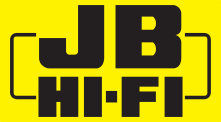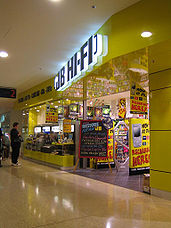- JB Hi-Fi
-
JB Hi-Fi Pty Ltd 
Type Public (ASX: JBH) Industry Retail Founded Keilor East, Victoria, Australia 1974 Headquarters Melbourne, Australia Number of locations 131+[1][2] Key people Terry Smart, CEO Products CDs, DVDs, Blu-ray discs, video games and consumer electronics Revenue A$2.731 billion (2009–10) [3] Website www.jbhifi.com.au, www.jbhifionline.com.au JB Hi-Fi (ASX: JBH) is an Australian CD, DVD, Blu-ray disc, video game and consumer electronics chain store.
Contents
History
JB Hi-Fi was established in Melbourne suburb of Keilor East by John Barbuto in 1974. Barbuto sold the business in 1983 to Richard Bouris and David Rodd who expanded JB Hi-Fi into a chain of ten stores in Melbourne and Sydney turning over $150 million by 2000, when they sold the majority of their holding to private equity. It was subsequently floated on the Australian Stock Exchange in October 2003.[4]
At first, the company specialised in Hi-Fi equipment. As the mainstream popularity of vinyl records declined, in 1991 JB Hi-Fi cleared out their entire stock of records and began offering exclusively CDs, and were one of the first Australian music retailers to do so. However, with the recent revival of vinyl records larger stores are stocking them again. This allowed JB Hi-Fi to open many new stores in Melbourne and later expand to other states. The chain now has stores all around Australia and some in Auckland, New Zealand's largest city and other parts of New Zealand.
Recently, while many music stores claim to have been losing money, JB Hi-Fi has increased profits by 26% FY10 when compared to 2008/2009.[3] JB also specialises in imported CDs, mainly from the United Kingdom and the United States, although CDs from other places, such as Africa, Asia and South America are available on special order.
JB Hi-Fi, has diversified its business from predominantly selling music CDs, and are now a major retailer for Plasma and LCD televisions, audio/visual, digital camera photography, portable audio, in-car entertainment, computer/video games, DVD movies, gadgets and information technology.
Currently JB Hi-Fi is the number 1 retailer of Apple Computer hardware in Australia, even more than Apple retail stores. JB Hi-Fi is also the sole store in Australia that sells Dell Computer hardware in retail stores.
The Sydney Morning Herald reported in June 2007 that JB Hi-Fi is now Australia's biggest CD retailer and is second in terms of sales of computer games, televisions and car stereos.[5]
In the full year 2009/10 report, it was reported that there are now 131 store locations in Australia and 10 in New Zealand.[3]
As of 2011 the company has thirteen stores open in New Zealand with eight in Auckland and one store each in Wellington, Hamilton, Palmerston North, Tauranga and Dunedin.
Acquisitions
In July 2004, JB Hi-Fi bought 70% of the Clive Anthony chain in Queensland.[4]
On 13 December 2006, JB Hi-Fi acquired the Hill and Stewart chain of electronics stores selling and operating in New Zealand for NZ$17.5 million (A$15.3 million).
In June 2007, JB Hi-Fi expanded its foothold in the Australian market by opening a Sydney branch of Clive Anthonys, at the Home Hub Castle Hill (formerly Supa Centre and The Hills Homemaker Centre) which departed from the market that they had already established a strong presence, in that they specialise in whitegoods.[citation needed]
In February 2010, JB Hi-Fi ceased to renew leases on Hill and Stewart stores in New Zealand and liquidated the business, citing management's wish to pursue the JB Hi-Fi market in New Zealand.[6]
Controversy
On 2 March 2009, the Australian Competition and Consumer Commission ruled that a JB Hi-Fi branch in Newcastle, New South Wales, had engaged in false, misleading or deceptive conduct in breach of the Trade Practices Act, by selling two second-hand mobile phones to a customer who had been led to believe they were new.[7]
In July 2009, JB Hi-Fi had mistakenly advertised on their website a Samsung flatscreen TV for $15 instead of 15 percent off, or $2,600.[8] One hundred and five individual customers who thought they were buying the TV for $15 had been told the deal was not valid. Instead they were being offered the TV $1000 off the price, or a discount of 29 percent.[9]
References
- ^ Fitzsimmons, Whitney (8 February 2010). "JB Hi-Fi posts 29pc profit rise". Australian Broadcasting Corporation (Lateline Business). http://www.abc.net.au/lateline/business/items/201002/s2813801.htm. Retrieved 24 April 2010.
- ^ Count of stores on websites @ 15 July 2010
- ^ a b c Full Year Results Presentation 30 June 2010 - www.asx.com.au, 9 August 2010
- ^ a b "About Us". JB Hi-Fi. 2002. http://www.jbhifi.com.au/aboutus/index.php. Retrieved 2007-02-16.
- ^ JB Hi-Fi pumps up volume - The Sydney Morning Herald, 8 June 2007
- ^ Slade, Maria (1 February 2010). "Darkest before dawn for retailers". The New Zealand Herald. http://www.nzherald.co.nz/business/news/article.cfm?c_id=3&objectid=10623383. Retrieved 11 September 2011.
- ^ Moses, Asher (2 March 2009). "JB Hi-Fi caught selling used phones as new". The Sydney Morning Herald. http://www.smh.com.au/news/technology/biztech/jb-hifi-caught-selling-used-phones-as-new/2009/03/02/1235842308455.html. Retrieved 2009-03-02.
- ^ Moses, Asher (23 July 2009). "JB Hi-Fi's $15 plasma TV too good to be true". WA Today. http://www.watoday.com.au/digital-life/hometech/20090723-dujo.html. Retrieved 2009-07-27.
- ^ Durie, John (23 July 2009). "JB Hi-Fi 'offer' pulled". The Australian. http://www.theaustralian.news.com.au/business/story/0,28124,25823932-30538,00.html. Retrieved 2009-07-27.[dead link]
External links
Categories:- Companies listed on the Australian Securities Exchange
- Companies established in 1975
- Retail companies of Australia
- Consumer electronics retailers of Australia
Wikimedia Foundation. 2010.


